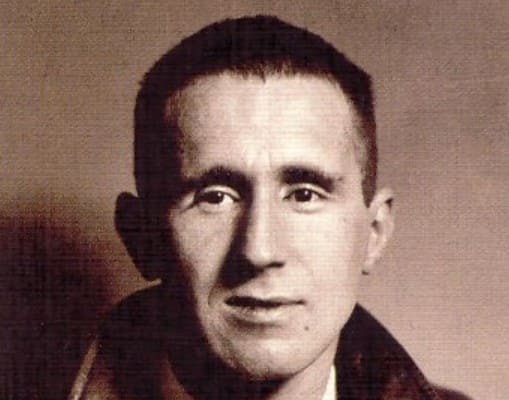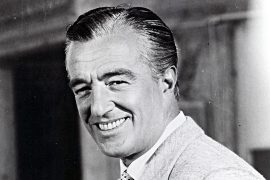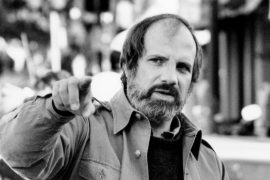The German writer and director is considered the most influential European dramatist and poet of the 20th century; he is considered the founder of epic theater. With his concept of epic theater, Eugen Bertolt Friedrich Brecht developed new presentation concepts that are characterized, among other things, by an aesthetic effect that appeals to the audience. His dramas combine didactic and artistic aspects. He also placed his lyrical works in the service of his Marxist views and gave new impetus to modern poetry. Brecht created an extensive and varied work, which includes 30 plays, 150 prose texts, 1,300 poems, various songs, three novels, numerous fragments, diaries and letters…
Eugen Bertolt Friedrich Brecht was born in Augsburg on February 10, 1898, the son of the future factory director Bertolt Brecht and his wife Sophie, née Brezing.
After elementary school, Brecht attended the Royal Realgymnasium in Augsburg from 1908 to 1917 (today: Peutinger-Gymnasium). In 1917 he completed his Notabitur and then began in the same year to study, first at the Faculty of Philosophy in Munich. He later switched to medical school. In 1918 he was drafted into military service and worked as a doctor in an epidemic hospital in Augsburg. After the war he continued his medical studies, but preferred to take part in lectures on theater studies and occupied himself with his literary plans. During this time he met the director Erich Engel, the writer Lion Feuchtwanger and the comedian Karl Valentin, among others. In 1922 his drama “Drums in the Night” premiered. Brecht was very successful with this, and in the same year he not only received the Kleist Prize, but also a position as dramaturge at the Munich Kammerspiele.
In that year, 1922, he married the singer Marianne Zoff, with whom he had a daughter named Hanne. From 1924 he worked as a dramaturge at the Deutsches Theater in Berlin under the direction of Max Reinhardt. Brecht’s early poetic works were summarized in the “Hauspostille” (1927). In 1928 he successfully performed his “Threepenny Opera” in the Theater am Schifferbauerdamm, where he was able to realize further works until 1933. In 1927 he divorced and married the actress Helene Weigel two years later. Brecht’s relationships with women were often exploitative in nature. Some of them had a strong influence on his artistic work, such as Elisabeth Hauptmann, Margarete Steffin or Ruth Berlau. After Hitler seized power in 1933, Bert Brecht and his family fled to Skovbistrand near Svendborg in Denmark via Prague, Vienna, Zurich and France. From Svendborg it went on to Sweden in 1939 and to Finland in 1940.
After traveling via Moscow and Vladivostok, he moved to Santa Monica, California, USA. The collection “Svendborg Poems” (1939) contained exillyrics that opposed National Socialism and advocated socialism. It contains his most important works, such as “Questions of a Reading Worker”, “Legend of the Creation of the Book of Taoteking on Laotse’s Way into Emigration” or “To Those Born Later” and others more. Other works followed in the 1940s, which were characterized by anti-fascist attitudes. Brecht’s further developments in theater theory then led to the combination of teaching and art during his exile. Works such as “Mother Courage and Her Children” (first performed in 1941), “The Good Man of Sezuan” (first performed in 1943), “Life of Galileo” (first performed in 1943) or “The Caucasian Chalk Circle” (first performed in 1948) stand for this.
In 1947 Brecht had to appear before the Un-American Activities Committee. A journey then took him via Paris to Zurich. In 1948 he moved to East Berlin and founded the Berliner Ensemble with his wife Helene in 1949, which performed in the Theater am Schiffbauerdamm from 1954. There Brecht was able to try out productions of his own and others’ plays, such as those by Jakob Michael Reinhold Lenz, William Shakespeare or Jean Baptiste Poquelin Molière. In 1950 Brecht took Austrian citizenship and bought a house in Buckow in Märkische Schweiz. The relationship between Brecht and the GDR state and party leadership was not without problems, but he was nevertheless honored with important prizes, such as the GDR National Prize, first class, in 1951 or the Stalin Peace Prize in 1954. Brecht achieved his significant impact in the literary genre of drama and as a theater theorist.
His early dramas are characterized by an anarchist attitude and anti-bourgeois provocation. He developed a theory of epic theater that was concerned with an aesthetic effect that would appeal to the audience. His performances aimed to suggest to the viewer that the world could be changed in consensus with Marxist theory. In order not to miss his effect, Brecht dispensed with traditional theatrical effects and alienated the plays with recorded comments, sayings, projections or songs. Bert Brecht excelled as a narrator in his “Calendar Stories” (1948), which stand in the long tradition of teaching, but with a critical reference to the times. Furthermore, his “Stories from Mr. Keuner” should be mentioned in their aphoristic way of writing, which complement Brecht’s narrative work. Apart from the “The Threepenny Opera” (1929), there are only a few fragments such as “The Business of Mr. Juluis Caesar” (1949) or the “Tui-Roman”, which are among his epic major forms.
The “Notes on the Opera ”Rise and Fall of the City of Mahagonny”” (1930) realized his theory of epic theater in principle. By studying Marxism, he continued to develop his anti-bourgeois plays, so that with “Saint Joan of the Slaughterhouses” (premièred in 1959), he created his first Marxist work in an uncompromising form. In the “Buckower Elegien” the poet developed a critical stance on his personal political views and on politics and society in the GDR after the workers’ uprising of June 17, 1953. Brecht’s literary work is characterized by its explicit reference to current events.
But this reference is also always made in his pieces for other media such as radio or film. Particularly worth mentioning are the radio lesson “Flug der Lindberghs” (first performed in 1929) with music by Paul Hindesmith or the screenplay for the film “Kuhle Wampe”, which was banned in 1932. In addition, however, Brecht also dealt with the literary tradition, in which he created counter-drafts, for example. He repeatedly subjected his own works to critical updating and modification. Bertolt Brecht created an extensive and varied oeuvre, which includes 30 plays, 150 prose texts, 1,300 poems, lieder and songs, three novels, numerous fragments, diaries and letters.
Eugen Bertolt Friedrich Brecht died on August 14, 1956 in East Berlin.
Why is Bertolt Brecht so important?
Bertolt Brecht is considered the founder of the Lehrstück and the epic theatre. The Lehrstück is instructive instruction that aims to stimulate thinking and change one’s own actions.
What did Bertolt Brecht do?
Brecht founded and implemented epic theater or “dialectical theater”. His best-known plays include The Threepenny Opera, Mother Courage and Her Children, and the work critical of capitalism, Saint Joan of the Slaughterhouses.
What did Brecht criticize?
After the Second World War, Brecht criticized the fact that West Germany had exposed itself to foreign rule. And he doesn’t keep his criticism of Kurt Schumacher and Konrad Adenauer behind the mountain either. Schumacher publicly spoke out against the Communist Party of the GDR.
What shaped Brecht?
Bertolt Brecht is one of the most important German playwrights. In addition, his life was shaped by the flight into exile, his enthusiasm for communism – and by numerous women’s stories.
How many parables did Brecht write?
The edition contains all 58 stories that were found in the so-called “Züricher Mappe”. The Keuner stories were always written in connection with Brecht’s other works. They appeared in the “Experiments” series of books along with other experimental texts, scenes from dramas and poems.
What is typical of Brecht?
Brecht aimed at the mind of the individual. He wanted to use targeted measures to get viewers to think and act. By critically reflecting on what is happening on stage, the audience can also gain insights into society and its grievances.
To which epoch does Brecht belong?
You can classify Bertolt Brecht into the epochs of New Objectivity, exile literature and rubble literature. His life was mainly shaped by the Second World War and his escape from National Socialism.
What did Brecht use dramaturgically?
According to Brecht, epic theater is intended to set social and political changes in motion. The demonstration of social contradictions on stage is intended to activate viewers, convey criticism of belief in fate and a materialistic attitude.
How many books did Brecht write?
Bertolt Brecht – 13 Books – Pearl Divers.
What does Bertolt Brecht want?
Brecht was pursuing exactly the opposite goal with his “epic theatre”: instead of mere sympathy, he wanted people to think for themselves and come to the decision to change something.
Was Brecht a National Socialist?
Hasn’t been spoken yet. Bertolt Brecht (1898-1956) was a playwright. Because he was a communist and his political convictions were reflected in his plays, he left Germany after the Reichstag fire in February 1933, even before the National Socialists took power.
Why did Brecht write the life of Galileo?
Contain scientific and non-religious messages. Brecht does not want Galileo’s struggle to be understood as a religious one, but rather as a socio-political one, about which the viewer can form his or her own opinion.
Where is Brecht from?
Augsburg, Germany
Where are you moving Brecht to?
The poem is typical of the epoch of Sturm und Drang.
What works did Brecht write in exile?
Life of Galileo
The good man of Sezuan
Mother Courage and Her Children





